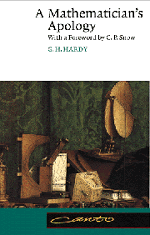Summary
ACHESS problem is genuine mathematics, but it is in some way ‘trivial’ mathematics. However ingenious and intricate, however original and surprising the moves, there is something essential lacking. Chess problems are unimportant. The best mathematics is serious as well as beautiful— ‘important’ if you like, but the word is very ambiguous, and ‘serious’ expresses what I mean much better.
I am not thinking of the ‘practical’ consequences of mathematics. I have to return to that point later: at present I will say only that if a chess problem is, in the crude sense, ‘useless’, then that is equally true of most of the best mathematics; that very little of mathematics is useful practically, and that that little is comparatively dull. The ‘seriousness’ of a mathematical theorem lies, not in its practical consequences, which are usually negligible, but in the significance of the mathematical ideas which it connects. We may say, roughly, that a mathematical idea is ‘significant’ if it can be connected, in a natural and illuminating way, with a large complex of other mathematical ideas. Thus a serious mathematical theorem, a theorem which connects significant ideas, is likely to lead to important advances in mathematics itself and even in other sciences. No chess problem has ever affected the general development of scientific thought; Pythagoras, Newton, Einstein have in their times changed its whole direction.
- Type
- Chapter
- Information
- A Mathematician's Apology , pp. 88 - 91Publisher: Cambridge University PressPrint publication year: 1992

